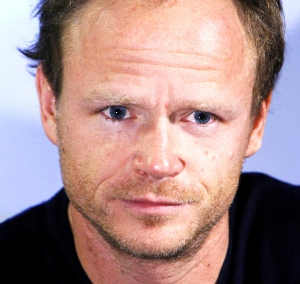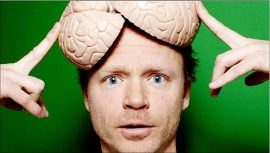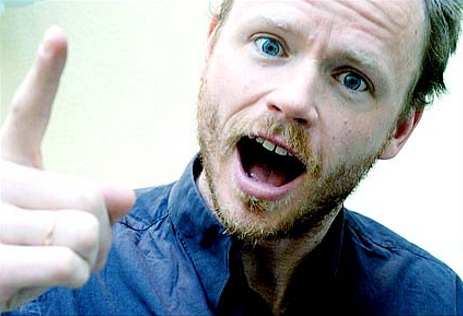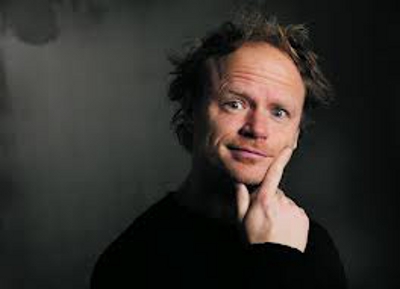- How Did Harald Eia Cause Norway’s Gender Institute To Lose All Its Funding?
- Which Is More Important – Nature Or Nurture?
- The Story Of How Norway Became Less Politically Correct
Full Interview Audio

Personal Info
Sports Teams:Liverpool from the UK
Favourite Books:
- The Blank Slate by Steven Pinker
- The Selfish Gene by Richard Dawkins
- The Moral Animal by Robert Wright
Most Influenced By:Larry David
Relevant Link: http://vimeo.com/user5971760/videos
Website: http://www.funkenhauser.no
Interview Highlights
This is a condensed, lightly edited transcript of an audio interview. The full audio is available and highly recommended. The interviewee may post clarifications in the comments.
Adrian Bye: Today we’re here with Harald Eia, who is one of the best known comedians in Norway. Harald made a very interesting TV show called Brainwash and that’s what we’re here to talk about today. So, Harald, thanks for joining us. 
Harald Eia: Thank you so much, it’s an honor.
Adrian Bye: Do you want to tell us a little bit about who you are and what you’ve been doing?
Harald Eia: I’m a trained sociologist. After working a couple of years in research I went into television, in comedy, but I kept on reading science. My focus shifted from traditional sociology to biology, evolutionary psychology and behavioral genetics, Steven Pinker and David Buss, all that new science of the human mind and human nature. For me that was so new and interesting and went against everything I was taught at university. After doing some research I felt that the whole academic life and all culture was uninformed about these perspectives. So I decided to make a popular science show about that.
Adrian Bye: I think I read a quote from you somewhere where you said you felt cheated.
Can you maybe talk a little more about that?
Harald Eia: Yes, sure. Basically, when you study social science, especially sociology, there is some implicit premise of human beings that we are born with a blank slate, that basically all of our feelings and the way we think and all our culture is just a product of socialization and influence from our parents, media, society. And that the other part of the story, the nature part, is being ignored basically. For instance, why is it that children who have parents who are academics also become academics? Why this is called the reproduction of the class society? Why is this reproduced from one generation to another? The only explanation I was given at university was that it has something to do with how you’re socialized at home, how you’re influenced by the other books in the shelves your parents tell you to read. If somebody asked ‘what about genetics?’, maybe you would be laughed at, or ignored, or the teachers would say something like ‘I think we gave that way of thinking up after the Second World War’. But when I started reading these things, behavioral genetics, when you study twins and children who are adopted, it turned out that genetics has a whole lot to say. I found that very interesting, and nobody told me this at university, even though I studied class structure and inequality. Because I wasn’t told about these perspectives I felt like it was an intellectual scandal.
Adrian Bye: Right. We’re taught about Darwinism, Charles Darwin, and we’re taught that we’ve descended from the sea and we came from fishes. We’re not really taught what’s going on. I saw an interview with Richard Dawkins talking about how he looked at it the first time and that’s how he understood it. Then ten or so years later he looked at it again and really started to understand it. It wasn’t until the third time that he really looked at Darwinism that he really got it. And I found that it was the same process for me, too. It’s shocking that we’re not taught all of this. 
Harald Eia: Yes. Sometimes you read in the newspaper that scientists have found the gene for watching television or men have a bigger penis because of. The explanations are so simple so you learn to ignore them. Most intellectuals are smart people and tend to ignore those perspectives because they find it too stupid, too simple. They never make the effort to really go into those problems or perspectives. I realized for instance when it comes to Darwinism, most liberal educated people believe in Darwin. But the belief stops at the neck or that our psychological life or inner mental life has nothing to do with evolution. But of course it does, evolution has formed the way we think, the way the neurons are wired.
Adrian Bye: Here in the US they brought Pygmies over from Africa. Pygmies are a race that are known for having an IQ on average of 54. They ended up being kept in a zoo. Now, that is the extreme end, and then we have Hitler that’s come along and created the Holocaust. There is obviously some really harsh elements to all of this. I would actually be in favor of brainwash and saying hey, let’s not talk about this stuff because some of it is too nasty. Where do you stand on these sorts of things, and how do you think it should be handled?
Harald Eia: I think that’s difficult. In Norway we don’t speak about race. We don’t use that word because it’s so closely associated with the Nazi regime. So we don’t speak about that, we don’t speak about skin color, we don’t talk about the whole race thing. As the starting point it was taboo already for me. Then I talked to some behavioral genetics that study adopted children, twins and all that, and I just asked them can we talk about race? They said no, we can’t talk about that. Why not? Turn off the camera. Why can’t we talk about it? Is it because you have some results you don’t want to talk about? Yes. We realized oh, this is a hot button, this is really dangerous. We realized that nobody knows whether for instance there’s a genetic component to the intelligence differences between people because no one really want to study it. And those few who say let’s just face reality, there are some genetic differences when it comes to a rich intelligence level between different people on this planet, they are far right. They are extremists. They want to talk about it. So the whole field of thinking about some inherited differences between people, when it comes to mental faculties, is so political already.
And then, why should we do it? Why should we focus on it? Could we learn something from it? Would it benefit some people? I’m not sure. Charles Murray said we have to face these realities because if we want to help people it’s better to know why some do better in school, why some score a lower scores in IQ tests. But at the same time people are so stigmatized. If Charles Murray said that on average African-Americans have a lower IQ score because of the genetics, and if you were a smart African-American man, it would hurt you. It wouldn’t help you in anything. In an ideal world people would treat everybody as individuals, but in the real world we don’t do that. 
Adrian Bye: You made this series which you’ve put online. I started watching it, and I was, oh my god, this guy figured it out how to take really sensitive material about both gender and about race and communicate it to the world. You did it in one of the most feminist countries in the world. Do you want to talk about what you did and the response?
Harald Eia: My original idea was to present some new and exciting findings and perspectives. For instance, why is it that women in this gender egalitarian society still prefer not to work with engineering and mechanics and prefer to work as nurses? There are two suspects there: that could be nature, it could be nurture, it could be both. One said it can only be nurture, that’s the traditional sociology perspective, and the other said it can probably be some nurture, but it’s a lot of nature as well. I wanted to go out and find out if it was true. Can the researchers be wrong? And then we went back to them, to the researchers, and presented them with Steven Pinker, what he said. And, as most people do, scientists as well, they’re just no, I won’t change my mind at all.
But when we broadcast it, it exploded. The debate in national newspapers and in television programs went on for at least half a year because we attacked some of the most rhetorically strong people in our society. They were furious. It had such a tremendous effect. It really took us by surprise that people would get so mad. On average, there was a feeling that many intellectuals were not seeking the truth. Some scientist shouldn’t care about having one pet theory because it suits one left-wing ideology better. I think it was a relief for a lot of people. At last, somebody there is going against that political correctness that’s holding the debate down and stigmatizing some perspective that’s right-wing. People felt it was kind of liberating. I don’t know how much it changed but some of the left-wing intellectuals now aren’t as arrogant and ignorant as they used to be. And that’s a good thing.
Adrian Bye: Having researched all of this and gender differences, what do you think about concepts like free will?
Harald Eia: It’s meaningful to talk about free will. I’d say it’s a huge and very complicated question. We are probably not free to choose our preferences. They are kind of given. But we can choose what to do still. I mean, we can go against some of our natural feelings, we have the pill so we can have sex without having children, there is a lot of room for maneuvering in this field of emotions and mechanism we are born with. We can choose to not be slaves of our emotions and preferences. If we know how our mind works, and why it works at its best we can organize our life in a way that makes us freer. It’s a bit of a philosophical question, but I feel the more you know about yourself, the freer you can get. 
Adrian Bye: Have you ever heard of an author named Ayn Rand? She is one of my favorite authors. In Atlas Shrugged, which is her key book, there is the State Science Institute which is supposed to verify how science works in the country and its connection with business. There is a lot of problems with corruption in the State Science Institute and how their messages is being distorted. I think you may want to read Atlas Shrugged because the parallels between that and what you’ve found is identical.
Harald Eia: Yes, I should read it. There is always a problem, at least in Scandinavia, to do gender research. There tend to be the same kind of people involved, they’re all on the left. It’s never healthy to have a group of people seeking truth that are all the same. It’s good to have both genders, to have people from different political stands. I wouldn’t say that the social science in Norway was corrupted, but they only looked at the world from one perspective. They did that because they were all thinking the same way. They had the same background, the same values. We have to make sure that we quote not only women into social science, but conservatives and people who believe in the free market. So it’s healthy to have these different opinions. It’s easier to seek the truth and to be intellectual uncorrupt if there’s a polyphony, different perspectives.
Adrian Bye: What you are saying goes to the heart of nature versus nurture. We don’t know where the line is between nature and nurture. It’s somewhere there. And you need to get both perspectives to be able to find where the right position is. The impression I got from your TV series the people, maybe corrupt isn’t the right word, but they weren’t seeking the truth as much as they should.
Harald Eia: They had decided already what was the truth and they didn’t take the other perspectives seriously. Their level of knowledge when it came to biology was like a 8th grade. If you want to help women, if you want to make a society where the genders are equal, have equal rights, it’s good to know whether there is a natural difference in women and men psychology. I think it’s smart to have a perspective to make a happier life for women instead of pretending that the genders are equal and then pressing women and men to do things they don’t want to.
Adrian Bye: The biggest people that responded after your TV show, was that the angry white men in Norway?
Harald Eia: Yes, they were angry at these gender researchers, very angry. There is a lot of hate against political correctness. But I hope shows like Brainwash will give people and the angry white men a feeling that it’s okay to discuss these things instead of the political correctness that tends to hold this debate down. For instance, ten years ago in Norway it was forbidden to discuss any problems when it comes to immigration. And in Sweden it’s still like that. What happens is you get a right-wing party that’s really popular, really far right-wing, but you lose control over the debate because the debate is not free. It’s important always to try to have these free discussions inside society instead of saying we can’t discuss this. That makes people really angry.
Adrian Bye: How was the response of women to the show?
Harald Eia: Women are hurt from hearing, hey, you are a woman, you can’t do this. They are tired of hearing that there are some differences between men and women from birth, but on the other side the state and the education system have always been pushing women, hey go into science, go into engineering, you should do more of this, less of that. Women’s interest in fashion, humans, feelings, all that, is not as valuable as men’s interest in science, technology, money status. So many women felt it was liberating. For many women I talked to it was like a burden was off their shoulders. I think they should follow whatever their preferences are. Most women were happy. Of course some women had based all their world view on this kind of research, they were kind of provoked. Our message was not you’re wrong, our message was we have to think in both nature and nurture. It wasn’t very extremist.
Adrian Bye: We don’t know where the line is between nature and nurture in all these things, and we probably won’t for another hundred or more years. We can’t know, and it probably depends on the person, too.
Harald Eia: Absolutely. It will strangely enough depend in what society we live in. Two non-identical twins they ended up having basically the same life a hundred years ago. Today, two non-identical twins have very different lives because what they’re born with matters more and the social background matters less. And the same thing for women. If you were a smart woman two hundred years ago, what could you do? Nothing. But today you can realize your potential. So nature has more to say now than it used to in a way.
Adrian Bye: There is no doubt obviously that that’s all improved. It’s just where is the line in the end and making sure that people are living instead of just distorted lives happy lives. I think that would be your goal with all of that, would it not?
Harald Eia: Absolutely, yes.
Adrian Bye: We are almost out of time. Is there anything that you want to tell us about
which we haven’t covered?
Harald Eia: I would recommend Jonathan Haidt, who has written a book, The Righteous Mind, which I really think will take the whole Brainwash discussion nature versus nurture one step further. He’s studying how all these tendencies we’re born in can be weakened or how culture can make it stronger. I found it’s very interesting. So I hope I can do something maybe based on his work. It’s exciting times we’re living in.









